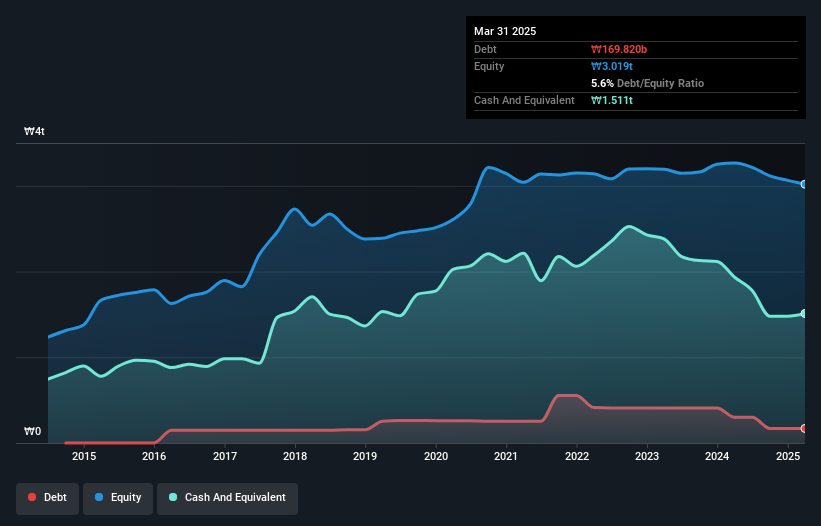The external fund manager backed by Berkshire Hathaway's Charlie Munger, Li Lu, makes no bones about it when he says 'The biggest investment risk is not the volatility of prices, but whether you will suffer a permanent loss of capital.' It's only natural to consider a company's balance sheet when you examine how risky it is, since debt is often involved when a business collapses. As with many other companies NCSOFT Corporation (KRX:036570) makes use of debt. But the real question is whether this debt is making the company risky.
We've discovered 1 warning sign about NCSOFT. View them for free.When Is Debt Dangerous?
Debt and other liabilities become risky for a business when it cannot easily fulfill those obligations, either with free cash flow or by raising capital at an attractive price. In the worst case scenario, a company can go bankrupt if it cannot pay its creditors. While that is not too common, we often do see indebted companies permanently diluting shareholders because lenders force them to raise capital at a distressed price. Having said that, the most common situation is where a company manages its debt reasonably well - and to its own advantage. When we think about a company's use of debt, we first look at cash and debt together.
How Much Debt Does NCSOFT Carry?
You can click the graphic below for the historical numbers, but it shows that NCSOFT had ₩169.8b of debt in March 2025, down from ₩299.7b, one year before. But on the other hand it also has ₩1.51t in cash, leading to a ₩1.34t net cash position.

How Strong Is NCSOFT's Balance Sheet?
The latest balance sheet data shows that NCSOFT had liabilities of ₩368.2b due within a year, and liabilities of ₩494.7b falling due after that. Offsetting this, it had ₩1.51t in cash and ₩171.1b in receivables that were due within 12 months. So it can boast ₩819.4b more liquid assets than total liabilities.
This excess liquidity suggests that NCSOFT is taking a careful approach to debt. Given it has easily adequate short term liquidity, we don't think it will have any issues with its lenders. Succinctly put, NCSOFT boasts net cash, so it's fair to say it does not have a heavy debt load! There's no doubt that we learn most about debt from the balance sheet. But ultimately the future profitability of the business will decide if NCSOFT can strengthen its balance sheet over time. So if you want to see what the professionals think, you might find this free report on analyst profit forecasts to be interesting.
Check out our latest analysis for NCSOFT
Over 12 months, NCSOFT made a loss at the EBIT level, and saw its revenue drop to ₩1.5t, which is a fall of 9.3%. That's not what we would hope to see.
So How Risky Is NCSOFT?
Although NCSOFT had an earnings before interest and tax (EBIT) loss over the last twelve months, it made a statutory profit of ₩75b. So taking that on face value, and considering the cash, we don't think its very risky in the near term. With mediocre revenue growth in the last year, we're don't find the investment opportunity particularly compelling. The balance sheet is clearly the area to focus on when you are analysing debt. However, not all investment risk resides within the balance sheet - far from it. To that end, you should be aware of the 1 warning sign we've spotted with NCSOFT .
Of course, if you're the type of investor who prefers buying stocks without the burden of debt, then don't hesitate to discover our exclusive list of net cash growth stocks, today.
Valuation is complex, but we're here to simplify it.
Discover if NCSOFT might be undervalued or overvalued with our detailed analysis, featuring fair value estimates, potential risks, dividends, insider trades, and its financial condition.
Access Free AnalysisHave feedback on this article? Concerned about the content? Get in touch with us directly. Alternatively, email editorial-team (at) simplywallst.com.
This article by Simply Wall St is general in nature. We provide commentary based on historical data and analyst forecasts only using an unbiased methodology and our articles are not intended to be financial advice. It does not constitute a recommendation to buy or sell any stock, and does not take account of your objectives, or your financial situation. We aim to bring you long-term focused analysis driven by fundamental data. Note that our analysis may not factor in the latest price-sensitive company announcements or qualitative material. Simply Wall St has no position in any stocks mentioned.
About KOSE:A036570
NCSOFT
Develops and publishes online games in Korea, Japan, Taiwan, the United States of America, Europe, and Canada.
Undervalued with excellent balance sheet.
Similar Companies
Market Insights
Community Narratives


Recently Updated Narratives


MINISO's fair value is projected at 26.69 with an anticipated PE ratio shift of 20x


The Quiet Giant That Became AI’s Power Grid


Nova Ljubljanska Banka d.d will expect a 11.2% revenue boost driving future growth
Popular Narratives


The company that turned a verb into a global necessity and basically runs the modern internet, digital ads, smartphones, maps, and AI.


MicroVision will explode future revenue by 380.37% with a vision towards success



